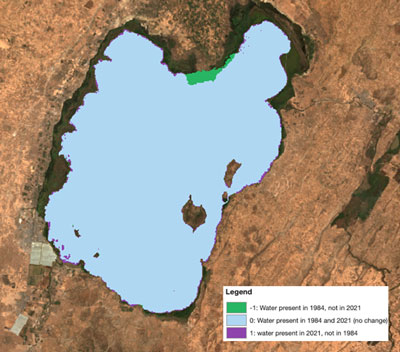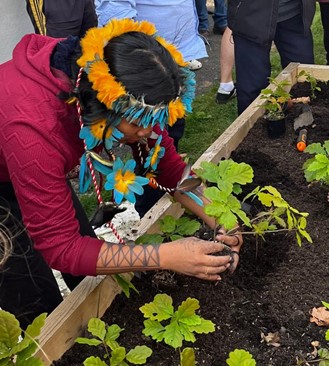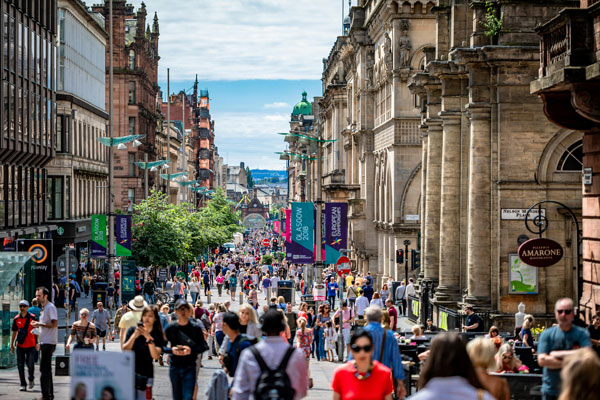
Sustainable StrathclydeStrathclyde's Innovations in Land Restoration and Resilience – World Environment Day
To celebrate World Environment Day with its theme of Land Restoration, Desertification, and Drought Resilience, we (Sustainable Strathclyde) and the Centre for Sustainable Development are showcasing our efforts in reversing land degradation and building drought resilience through various research and projects initiatives.
Highlights include the use of satellite imagery to monitor water usage in Ethiopia, collaborative efforts to protect the Amazon with indigenous communities, and innovative urban sustainability projects run by the Institute of Future Cities.
Space for a Sustainable Earth
Our Department of Mechanical and Aerospace Engineering (MAE) focuses on sustainable applications in Space studies. The Aerospace Centre of Excellence (ACE) emphasizes Earth Observation (EO) studies, analysing data to promote sustainable activities. This research is carried out through various initiatives, including ongoing EO applications in humanitarian and environmental research within the Intelligent Computational Engineering (ICE) group and the master’s degree in Satellite Data for Sustainable Development.
At the moment, PhD student Seonaid Rapach, along with Dr. Annalisa Riccardi (MAE) and Dr. Rhonda Wheate (Law School), is conducting research to monitor the impacts on local water systems.
Lake Ziway in Ethiopia, a crucial source of drinking water and local fishing activities, also supports large-scale industries and agricultural production. However, these activities affect the water levels, access and quality of the lake, affecting the lives of neighbouring communities.
This study, in collaboration with Water Witness, a charity promoting fair water usage, will leverage the unparalleled perspective of satellite imagery to analyse the water usage of Lake Ziway by the agrofloral industry.
By examining changes in the lake's size and correlating them with irrigation practices in nearby fields, the research aims to provide critical insights into the current agricultural footprints of the agrofloral industry and future expectations.
The findings will support ongoing efforts by the charity to ensure equitable water use for all stakeholders around the lake and will be presented at the Environmental Crime Workshop 2024, a joint initiative of the European Space Agency (ESA) and the Joint Research Centre (JRC) of the European Commission. Moreover, the team hopes this study will highlight the unique value of satellite data in future investigations.

Image shows water present in the lake from 1964 to 2021
Satellite imagery can go beyond limits, revealing the unseen and exploring the unreachable.
-Seonaid Rapach, PhD student
Restoring Lands and Resilience in the Amazon
Dr Brian Garvey, from our Department of Work, Employment, and Organisation, is collaborating with researchers, legal advocates and traditional and indigenous groups from Brazil's Amazon to raise awareness against mining and logging in the Amazon.
The recent delegation to the UK and Ireland, including Indigenous women and men from the Munduruku and Kayapó communities, confront the consequences of illegal mining, such as deforestation, and violence against riverine, forest and indigenous peoples. Dr. Garvey's research with Federal University of Para, and other partners, aims to amplify the voices of these communities and draw international attention to their struggles against environmental degradation and human rights violations.
We are used to outsiders telling our story. With our collective we tell our own story of how the forest is sick from invasion and mining, and how we will continue to resist. -Mondria Kirixi Munduruku, Young Leader from the Munduruku community
The research shows that illegality is found across smaller and larger-scale mining and sheds light on the involvement of UK firms in profiting from gold mining and land grabbing in the Amazon.
By exposing the exploitation of natural resources by international corporations, Dr Garvey emphasises the need to defend existing sustainable land management practices and reflects how the research partners also reject 'false' solutions in the region -such as carbon credits. This ongoing project supports an audio-visual collective of the Munduruku, which documents illegal activities and land invasions, showcasing the importance of indigenous-led efforts in environmental protection.

Holistic Approaches to Urban Challenges
The Institute for Future Cities improves urban life by promoting healthier, sustainable, and resilient cities through research and innovation. Their work addresses economic inequalities, sustainable urban systems, citizen well-being, and participation. This case study highlights the Institute's key projects aligned with sustainable urban development.
Sustainable Glasgow Initiative
The Institute wrote the first strategy for the Sustainable Glasgow Initiative, positioning Glasgow as a sustainability leader. They developed the city's first sustainable strategy, which significantly reduced Glasgow's carbon footprint, and revitalised urban areas. The initiative created jobs, improved community infrastructure, and addressed fuel poverty, contributing to Glasgow hosting COP26.

STEP UP Project
STEP UP (Strategies Towards Energy Performance and Urban Planning) enhances energy planning across Europe. The project developed a strategic energy planning approach to help cities met their stakeholders needs, improve energy efficiency, urban regeneration, economic growth, and fuel poverty reduction. The Institute currently collaborates with the University of Louisville and the City of Louisville to improve the city's urban planning. Louisville's historical and political context, including its heavy reliance on cars, has significantly influenced its urban planning strategies.
Partnership with UNIDO
The Institute partners with UNIDO, AIG, and Chatham House to support global cities in achieving sustainable and resilient futures. Through the Bridge for Cities event, they work closely with the city of Dhaka to develop and implement a plan to achieve their sustainability targets. This partnership helps implement tailored solutions to local challenges.
Through initiatives like Sustainable Glasgow, STEP UP, and global partnerships, the Institute drives meaningful change, addressing environmental challenges and improving urban life quality.

To deliver low carbon and net zero targets and get the support of society we need to approach in sustainability in ways that benefit what they care about (for example, health & wellbeing, work, infrastructure, and more). We cannot deliver sustainability in a bubble but in a way that helps society.
Director of the Institute for Future Cities